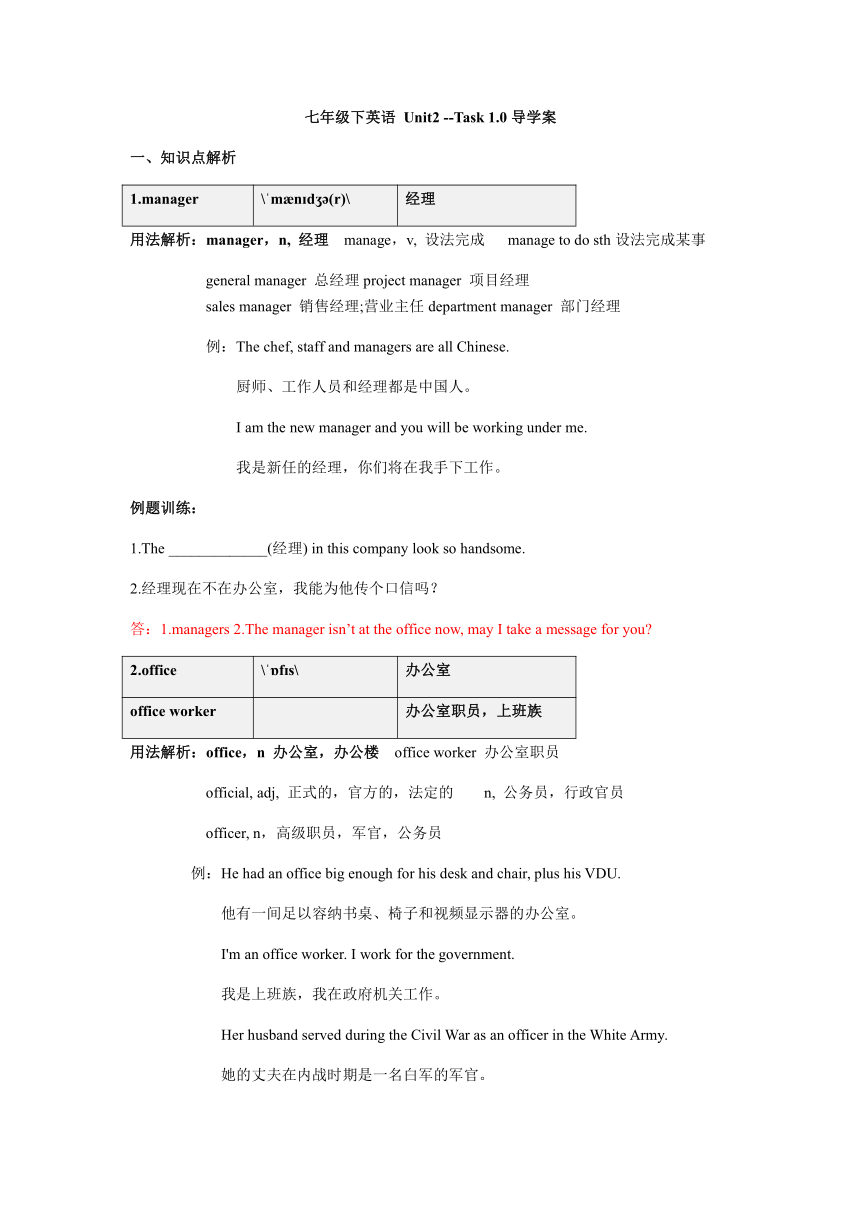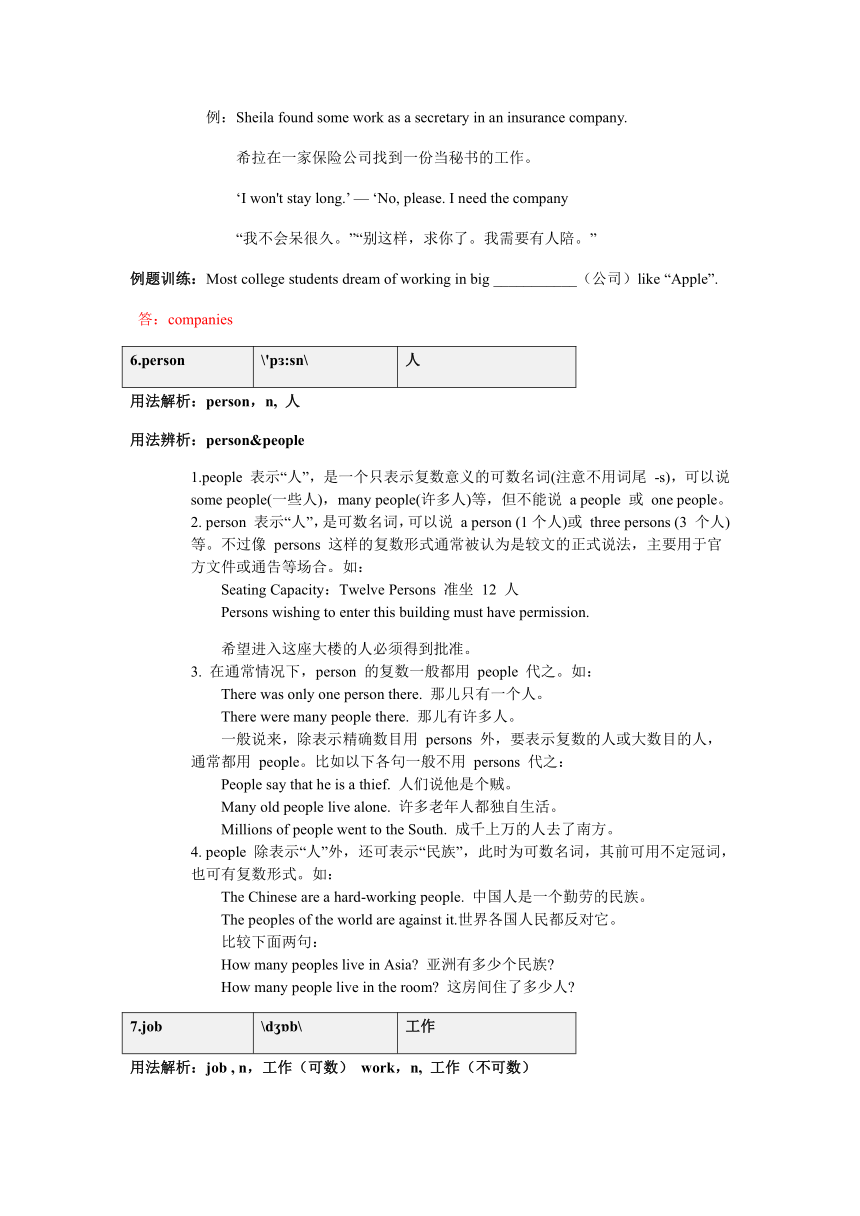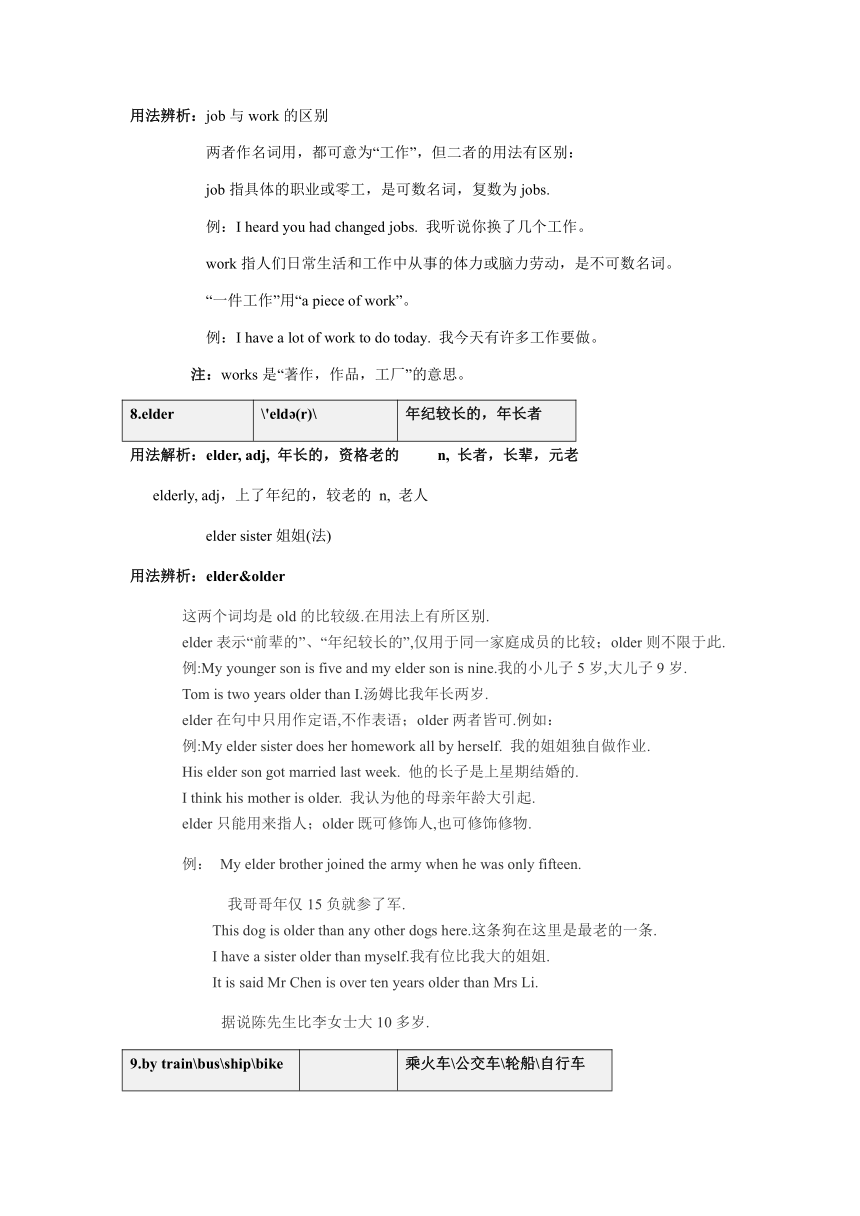江苏省仪征市第三中学2020年七年级下英语 Unit2 Neighbours Task 导学案
文档属性
| 名称 | 江苏省仪征市第三中学2020年七年级下英语 Unit2 Neighbours Task 导学案 |  | |
| 格式 | zip | ||
| 文件大小 | 67.5KB | ||
| 资源类型 | 教案 | ||
| 版本资源 | 牛津译林版 | ||
| 科目 | 英语 | ||
| 更新时间 | 2020-02-05 07:24:14 | ||
图片预览




文档简介
七年级下英语 Unit2 --Task 1.0导学案
1、知识点解析
1.manager \?m?n?d??(r)\ 经理
用法解析:manager,n, 经理 manage,v, 设法完成 manage to do sth设法完成某事
general manager 总经理project manager 项目经理
sales manager 销售经理;营业主任department manager 部门经理
例:The chef, staff and managers are all Chinese.
厨师、工作人员和经理都是中国人。
I am the new manager and you will be working under me.
我是新任的经理,你们将在我手下工作。
例题训练:
1.The _____________(经理) in this company look so handsome.
2.经理现在不在办公室,我能为他传个口信吗?
答:1.managers 2.The manager isn’t at the office now, may I take a message for you?
2.office \??f?s\ 办公室
office worker 办公室职员,上班族
用法解析:office,n 办公室,办公楼 office worker 办公室职员
official, adj, 正式的,官方的,法定的 n, 公务员,行政官员
officer, n,高级职员,军官,公务员
例:He had an office big enough for his desk and chair, plus his VDU.
他有一间足以容纳书桌、椅子和视频显示器的办公室。
I'm an office worker. I work for the government.
我是上班族,我在政府机关工作。
Her husband served during the Civil War as an officer in the White Army.
她的丈夫在内战时期是一名白军的军官。
The President is in Brazil for an official two-day visit.
总统正在巴西进行为期两天的正式访问。
例题训练: 你的哥哥将来想要做什么?办公室工作人员。
答:What is your brother going to be in the future?---Office worker.
3.policeman \p??li:sm?n\ (policemen)警察
station \'ste??n\ 局,所,站
police station 警察局
用法解析:policeman, n,警察(男警察) 复数:policemen
police,n, 警察,警方 police station 警察局
station, n,局,车站
例:The police are also looking for a second car 警方也在寻找另一辆车。
The policeman noted down every word I said. 警察把我说的每句话都记录下来。
At last the train arrived in the station 火车终于到站了。
例题训练: Whose keys are these? They are those __________ (policeman)
答:policemen’s
4.postman \'p??stm?n\ 邮递员
post \p?ust\ 邮政
post office 邮局
用法解析:post,n, 邮政 v, 张贴,邮寄
postman, n,邮递员 复数:postmen post office邮局
例:I am watching for the postman all the time. 我一直在等候着邮递员。
You'll receive your book through the post 书会邮递给你。
5.company \'k?mp?n?\ 公司
用法解析:company, n, 公司;伴侣 复数:companies
例:Sheila found some work as a secretary in an insurance company.
希拉在一家保险公司找到一份当秘书的工作。
‘I won't stay long.’ — ‘No, please. I need the company
“我不会呆很久。”“别这样,求你了。我需要有人陪。”
例题训练:Most college students dream of working in big ___________(公司)like “Apple”.
答:companies
6.person \'p?:sn\ 人
用法解析:person,n, 人
用法辨析:person&people
1.people 表示“人”,是一个只表示复数意义的可数名词(注意不用词尾 -s),可以说 some people(一些人),many people(许多人)等,但不能说 a people 或 one people。
2. person 表示“人”,是可数名词,可以说 a person (1个人)或 three persons (3 个人)等。不过像 persons 这样的复数形式通常被认为是较文的正式说法,主要用于官方文件或通告等场合。如:
Seating Capacity:Twelve Persons 准坐 12 人
Persons wishing to enter this building must have permission.
希望进入这座大楼的人必须得到批准。
3. 在通常情况下,person 的复数一般都用 people 代之。如:
There was only one person there. 那儿只有一个人。
There were many people there. 那儿有许多人。
一般说来,除表示精确数目用 persons 外,要表示复数的人或大数目的人,通常都用 people。比如以下各句一般不用 persons 代之:
People say that he is a thief. 人们说他是个贼。
Many old people live alone. 许多老年人都独自生活。
Millions of people went to the South. 成千上万的人去了南方。
4. people 除表示“人”外,还可表示“民族”,此时为可数名词,其前可用不定冠词,也可有复数形式。如:
The Chinese are a hard-working people. 中国人是一个勤劳的民族。
The peoples of the world are against it.世界各国人民都反对它。
比较下面两句:
How many peoples live in Asia? 亚洲有多少个民族?
How many people live in the room? 这房间住了多少人?
7.job \d??b\ 工作
用法解析:job , n,工作(可数) work,n, 工作(不可数)
用法辨析:job与work的区别
两者作名词用,都可意为“工作”,但二者的用法有区别:
job指具体的职业或零工,是可数名词,复数为jobs.
例:I heard you had changed jobs. 我听说你换了几个工作。
work指人们日常生活和工作中从事的体力或脑力劳动,是不可数名词。
“一件工作”用“a piece of work”。
例:I have a lot of work to do today. 我今天有许多工作要做。
注:works是“著作,作品,工厂”的意思。
8.elder \'eld?(r)\ 年纪较长的,年长者
用法解析:elder, adj, 年长的,资格老的 n, 长者,长辈,元老
elderly, adj,上了年纪的,较老的 n, 老人
elder sister姐姐(法)
用法辨析:elder&older
这两个词均是old的比较级.在用法上有所区别.
elder表示“前辈的”、“年纪较长的”,仅用于同一家庭成员的比较;older则不限于此.例:My younger son is five and my elder son is nine.我的小儿子5岁,大儿子9岁.
Tom is two years older than I.汤姆比我年长两岁.
elder在句中只用作定语,不作表语;older两者皆可.例如:
例:My elder sister does her homework all by herself. 我的姐姐独自做作业.
His elder son got married last week. 他的长子是上星期结婚的.
I think his mother is older. 我认为他的母亲年龄大引起.
elder只能用来指人;older既可修饰人,也可修饰修物.
例: My elder brother joined the army when he was only fifteen.
我哥哥年仅15负就参了军.
This dog is older than any other dogs here.这条狗在这里是最老的一条.
I have a sister older than myself.我有位比我大的姐姐.
It is said Mr Chen is over ten years older than Mrs Li.
据说陈先生比李女士大10多岁.
9.by train\bus\ship\bike 乘火车\公交车\轮船\自行车
用法解析:by train /bus/ship/bike
注意:by +交通工具表方式时,交通工具不做任何变化。
①He goes to workby car every day, but this morning he goes there in a car.
②We can do it by hands or on foot.
跟by有关的词组:
by the time( of) …到---时by the end of 到…为止by the way 顺便说一下
by sb 被某人
例:The window was broken by a little boy.
By the time we got there, the man died.
By the end of last month, they have made hundreds of buildings.
10.future \?fju:t??(r)\ 将来
课本例句:What are you going to be in the future?
用法解析:future, adj, 将来的未来的 n, 将来 in the future在将来
例:He is making plans for the future 他正在为将来制订计划。
例题训练:
11.artist \?ɑ:t?st\ 艺术家,(尤指)画家
课本例句:I’m going to be an artist.
用法解析:artist, n, 艺术家 -ist名词后缀
类似名词:cartoonist: 漫画家dentist: 牙科医生journalist: 记者
tourist: 旅行者scientist: 科学家typist: 打字员
violinist 小提琴家physicist 物理学家
例:I'm not a good artist. 我不是优秀的艺术家。
例题训练:这些天, 艺术家们正在担心穿什么去晚会?
答:The artists are worrying about what to wear to the party these days
12.sound \sa?nd\ 听起来
课本例句:That sounds like a good idea.
用法解析: sound意为“听起来”,是连系动词,后面跟形容词作表语。sound还可与介词like一起构成短语sound like,意为“听起来像”。sound也可作名词,意为“声音”。
例:The story sounds very interesting. 这个故事听起来很有趣。
It sounds like a good idea. 这听起来像是个好主意。
The birds in the park make beautiful sound.公园里的鸟发出美妙的声音。
像sound一样,类似的连系动词还有:look意为“看起来”;smell意为“闻起来”;taste意为“尝起来”;feel意为“摸起来”。
用法辨析:sound,n. 声音,(大自然的声音) voice 人的嗓音(可数),
noise 噪音,(不悦耳的声音)(不可数)
例题训练:
We can hear the baby’s sound. It ______ a little cat.
A. sound B. sounds C. sound like D. sounds like
答:D
13.sick \s?k\ 生病的,恶心的
课本例句:I want to help sick people.
用法解析:sick, adj,意为“生病的;恶心的”.在句中可作表语或定语。
sickness, n,相当于illness。
例:He doesn't come to school today because he is sick.他今天没来上学,因为他生病了。
We should help the sick girl. 我们应该帮助那个生病的女孩。
She has to stay at home because of her sickness.她因为生病,不得不待在家里。
用法辨析:sick&ill
sick作形容词,可作表语,也可作定语,修饰名词;而ill只作表语,不能作定语,所以不可修饰名词,若ill作定语修饰名词,此时的ill意为“坏的”,相当于bad。
例:The little boy is ill\sick.
There are many sick people here.这儿有很多病人。
There are many ill people here. 这儿有很多坏人。
例题训练:
1.The man's mother is . -- He has to look after his mother at home.
A. bad, sick B. ill; bad C. ill; sick D. sick, ill
2.“Take this medicine and it will make you ______ better soon,” the nurse says to the ______ boy.
A. feel; sick B. to feel; sick C. to feel; ill D. feel; ill
答:1.C 2.A
14.notice \'n??t?s\ 布告,通知
用法解析:noticen. 布告,通知(可数);注意(不可数)。
例:Please look at the notice on the wall.
v. 注意 notice sb do /doing sth 注意到某人做过或经常做/正在做某事
类似用法有watch、see、hear
例:Did you notice two boysplaying badminton when you walked past.
15.information \??nf??me??n\ 信息
课本例句:Please look at the information below.
用法解析:information,n, 信息(不可数)
news,新闻,消息(不可数) message,短信,信息(可数)
search for information查找信息
例题训练: Please look at the ________below. It may help you. (信息)
答:information
16.below \b?'l??\ 在…下面
课本例句:Please look at the information below.
用法解析:below, adv&prep, 下面,在...下面 反义词:above 在...上面
用法辨析:below&under
below指位置低于某物或在某物的下方,但不一定在某物的正下方,较为抽象。
例:His position in the company is below hers.他在公司的职位比她低。
The temperature today is below zero.今天温度低于0度。
under指在某物的正下方,有垂直在下的意思,其反义词是over
例:What's under the bridge?
表示数量,如表示年龄、物价等“低于”是,below和under通用
例:His father is below\under forty.他的父亲不到四十岁。
例题训练:.
Wendy lives on the tenth floor. Wilson lives on the eighth floor, so Wilson lives two floor____ Wendy .
A. under B. below C. above D. over
答:B
17.better \'bet?(r)\ (good/well的比较级)较好,更好
课本例句:They will make you feel better!
用法解析:better,adj, 更好的(good\well的比较级) adv,更好地(well的比较级)
例:I like green better.
We want to do the work better.
18.worry about 为...担心
课本例句:Are you worrying about what to wear to a party or how to design your home?
用法解析:worry,vi,“担心,担忧”,常构成短语worry about,意为“为……担心”。
worry,vt, 后常跟人作宾语,意为“使某人担心”。
worried, adj, 担心 be worried about,意为“为……担心”
例:You don't need to worry about your brother.你不必担心你的弟弟。
The bad boy often worries his mother. 这个不乖的男孩经常让他的母亲操心。
What a worrying piece of news it is! It makes all of us worried.
Jim, don’t worry about the result. I’m sure you will pass it.
例题训练:. I am _______ about how to learn English well these days. (担心)
答:worrying
19.design \d?'za?n\ *设计,构思
课本例句:Are you worrying about what to wear to a party or how to design your home?
用法解析:design, v, 设计,构思,n, 设计 designer, n,设计师
例:We may be able to design a course to suit your particular needs.
我们或许可以专门设计一门课程以满足你的特殊需求。
例句拓展:what\how to do的用法
what to do =how to do it如何做
例:I don't know what to do next.=I don’t know how to do it.
例题训练:我正在担心晚会穿什么,如何设计我的家。
答:I am worrying about what to wear and how to design my home.
20.group \ɡru:p\ 组,群
课本例句:All our group members know a lot about styles and colours.
用法解析:group, n, 组,群 a group of一群\组\队 in groups成群,分组
例:We often work in groups.我们经常分组工作。
A group of students are helping the old clean the rooms.
例题训练:我们所有的组员对颜色很了解。
答:All our group members know a lot about colours.
